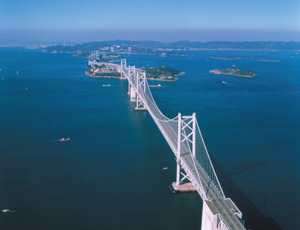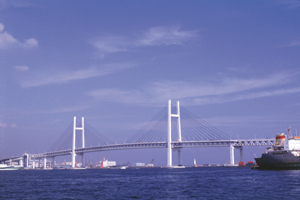Upfront: Can Koizumi Privatize Japan?
Back to Contents of Issue: August 2004
|
|
|
|
by By Gordon Feller |
|
 Japan's Parliament passed a set of bills providing for the privatization of four public highway corporations. Privatization of the heavily indebted highway operators is one of Prime Minister Junichiro Koizumi's flagship reform pledges. But as such pledges move towards implementation, his reform agenda is also taking on more radical features, as it moves from tackling bureaucratic control over the economy to changing the essentially socialist features of the state.
The Upper House passed bills which will lead by March 2006 to the privatization of the Japan Highway Public Corporation, Metropolitan Expressway Public Corporation, Hanshin Expressway Public Corporation and Honshu-Shikoku Bridge authority. The legislation passed through the Lower House in April. The four highway operators together have debts of some JPY40 trillion ($360 billion), which the government is required to pay off within 45 years. Passage of the bills will be claimed as a step forward by Prime Minister Junichiro Koizumi, who has long pursued such reforms in the face of strong opposition from within his ruling Liberal Democratic Party (LDP).
Deregulation began in earnest in the early 80s with the partial privatization of Japan National Railways (JNR), Nippon Telegraph & Telephone (NTT) and Japan Tobacco. The process slowed during the bubble economy when intense growth obscured the need for reform, but was revived under former Prime Minister Ryutaro Hashimoto and has since affected a wide range of sectors, from airfares to mobile phones.
Numerous corporate sector reforms have seen the restoration of holding companies, the easing of regulations governing corporate restructuring and a deregulatory Big Bang in the financial sector. The process has in general been incremental rather than revolutionary and is still being implemented based on past legislation.
With Koizumi's arrival in office in 2001, the direction of the deregulation and privatisation drive changed significantly. In addition to privatisation of the highway corporations, he has prioritized privatization of state-owned Japan Post--due to take place in April 2007. With these two major areas of deregulation now moving into the implementation stage, attention is turning to the opening of basic public services to increased competition.
In April, Koizumi attempted to boost political impetus behind the deregulation process by appointing a dedicated task force comprised of all cabinet ministers and headed by himself. This is intended to provide support at the highest political level for the deregulatory process--to put it beyond the veto of vested business interests. However, areas into which reform is now moving may provoke public (as well as bureaucratic) opposition, as they challenge the essentially socialist nature of Japanese society.
Privatization of medical, welfare and education services have now moved to the top of the deregulation agenda, along with issues such as the proposed 'corporatization' of agriculture. Outsourcing of numerous services currently provided exclusively by the state is also envisaged. This 'second phase' of deregulation is likely to prove more contentious than the first phase.
Koizumi's new deregulation panel has called for the reform of public health insurance; the further opening of hospital and school management to private sector participation; the reduced regulation of health and welfare services in order to stimulate competition; the possible outsourcing of government work in areas such as design and maintenance of government buildings and collection of official statistics and the consideration of deregulation measures in a range of other areas including nursing services, garbage collection and child day-care.
Both the private and public sectors would be allowed to submit bids for such projects. The panel was due to produce an interim draft of its proposals by midsummer, with a final report due in December for consideration by the full Cabinet. The panel's recommendations would then be incorporated into a new three-year deregulation and market-opening plan, which would be implemented with effect from April 2005.
By that time, it is hoped that deregulation will already have been effected in certain key areas in special 'deregulation zones' throughout the country. Under a scheme devised by the Koizumi administration, local authorities throughout Japan have been permitted to designate special zones where deregulation of certain areas of the economy may be carried on an experimental basis. There are already some 320 such zones, and the number may approach 1,000 before the end of this year.
Priority has been given to activities such as medical, welfare and education services, as well as corporate agricultural ventures. Deregulation in the special zones is permitted under special legislation which overrides normal regulations and administrative guidance affecting the relevant economic activities. The government hopes to demonstrate success by mixing the private and public provision of services in the deregulation zones, thereby overcoming bureaucratic and public opposition to deregulation.
But many of the elite are strongly committed to defence of the socialist structures of health, welfare and education services that were put in place in the postwar period. Moreover, there is evidence that a majority of the public also advocate public enterprise in such areas, as they are seen as offering equitable service to all Japanese.
Meanwhile, the arguments in favor of private participation hinge mainly upon the need for increased efficiency and the widening of choice to consumers. For example, proponents of deregulation argue that many types of medical treatment are not permitted in Japan because they are too expensive to be covered under public health care services, and it would be considered discriminatory to offer them to the few.
Until recently, each medical institution in Japan was required to obtain advance government permission to use new technologies and treatments offered under the public health insurance programme.
However, recent deregulation has eased some of these restrictions, allowing hospitals that meet specific criteria freely to use a certain range of designated technologies not covered by public health insurance. Nonetheless, opposition from the medical profession persists, partly because it is feared that human resources will be drawn away from the national public health system and into relatively small areas of private medicine.
Deregulation panels argue that private enterprise could not only widen the range of choice in areas such as medical, welfare and education services, but also reduce costs dramatically. They hope that private provision of essential services will reduce the burden on central government (directly and via grants given to local authorities) and thus enable Tokyo to reduce its enormous burden of outstanding debt, which currently amounts to some 160 percent of GDP.
Among the Japanese public, arguments relating to cost and efficiency do not yet appear to have prevailed over established values relating to social equity. A shift among Japanese companies in recent years from protecting 'stakeholder' interests to maximizing 'shareholder value' has resulted in rising unemployment. The impact has been limited more by the use of household savings than by official safety nets, but this has not yet damaged Koizumi's popularity among voters as he forges ahead with his reform drive.
Prospects for the deregulation and privatization of core public services will depend partly upon the success or otherwise of current experiments with such measures. Though he has in some respects benefited from his image as the champion of reform, Koizumi may face heightened public opposition to the next phase of deregulation. @ |
|
Note: The function "email this page" is currently not supported for this page.






